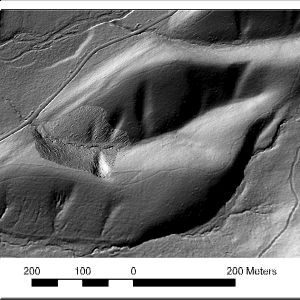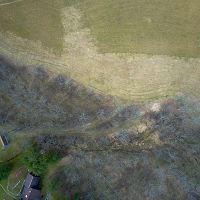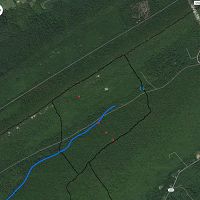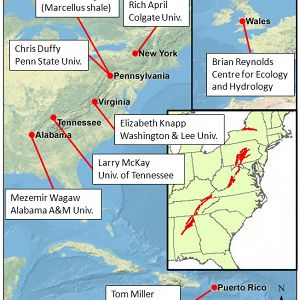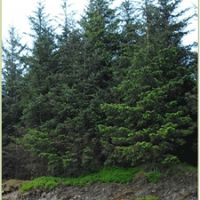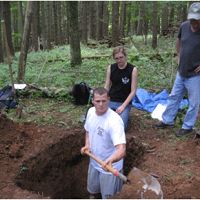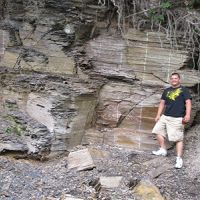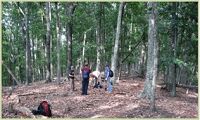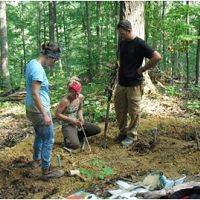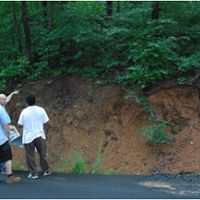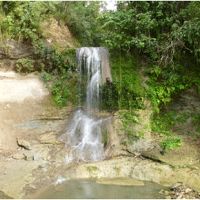INFRASTRUCTURE
The Susquehanna-Shale Hills CZO consists of an 8-hectare watershed in central Pennsylvania developed entirely on the Rose Hill shale, along with 7 satellite sites referred to as the Shale Transect: 4 developed on Rose Hill shale (New York, Virginia, Tennessee, Alabama), 1 on a stratigraphic equivalent of the Rose Hill formation (Plynlimon, Wales), 1 on a compositional equivalent to the Rose Hill (Puerto Rico), and 1 on a black shale (Marcellus shale, Huntingdon, PA). Research infrastructure in the main Shale Hills catchment includes an array of sensors to quantify water and energy fluxes within the catchment. These sensors provide high-frequency information about the atmospheric, hydrologic, and vegetation dynamics in the catchment. These data, in conjunction with ongoing geophysical, geo- and hydrochemical analyses and geospatial/remote sensing data, inform the ongoing research at the CZO.
The infrastructure at Susquehanna Shale Hills CZO includes physical research equipment and records (field-deployed sensors; sample specimen archives), data systems (time series and geospatial data archives; a wireless network to collect data from field sensors), and logistical support at a main site in central Pennsylvania as well as seven satellite sites. This infrastructure facilitates the ongoing exploration of critical zone processes and can be adapted to the requirements of various research projects. By harnessing existing instrumentation, data and personnel we can identify where future needs exist and respond appropriately. The intensive nature of infrastructure development at the main SSHCZO site has yielded a wealth of information that are now being applied for further studies. Details of the research infrastructure at the main SSHCZO site as well as the satellite sites are provided in this section.
Infrastructure News

FEATURED
CZ colleagues: Please contact us about proposals for NSF’s CZ Collaborative Network, due 02 Dec 2019
08 Jul 2019 - CZO will end Nov 2020, succeeded by the “CZ Collaborative Network”. Let’s explore how the CZ community can build upon the CZOs via new NSF proposals.

Delegation from China Geologic Survey visits Shale Hills CZO
03 Nov 2017 - During the week of October 30th, Penn State and SSHCZO hosted 15 scientists from the China Geological Survey, with interests ranging from saltwater...
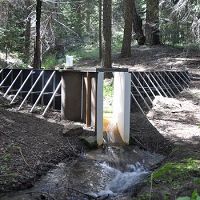
Water Resources Research Special Collection: Concentration-discharge relations in the critical zone
30 Oct 2017 - Water Resources Research published a new special collection in September 2017 featuring concentration-discharge research from multiple CZOs.
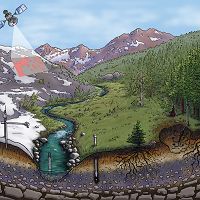
2017 CZO Webinar Series: Critical Zone and Society
06 Apr 2017 - 2017 CZO Webinar Series: Critical Zone and Society.
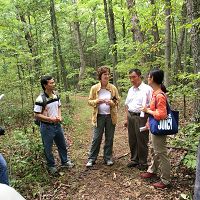
Shale Hills hosts eight-member delegation from China
09 Sep 2016 - To further their knowledge in critical zone research, a delegation of geologists from the China Geological Survey (CGS) and students from the China...

Team takes a Sunday field trip to the new “Ag” site to explore instrumentation design
29 Aug 2016 - Investigators and students traveled to the Cole Farm yesterday afternoon, downstream of Shale Hills proper, to explore the topography of the...
Field Areas:
Susquehanna Shale Hills Critical Zone Observatory
0.08 km2, 256-310 m elevation, 9.5 °C, 1050 mm/yr
Our interdisciplinary team works collaboratively in one observatory to advance methods for characterizing regolith, to provide a theoretical basis for predicting the distribution and properties of regolith, and to theoretically and experimentally study the impacts of regolith on fluid pathways, flow rates, and residence times.
Cole Farm (Agricultural Site)
0.65 km2,
Garner Run - Sandstone Forested
Shale Transect
7-24 °C, 1000-2500 mm/yr
Sites with constant parent lithology (Silurian Rose Hill Formation) used to study the effects of climate on regolith formation, soil geochemistry, formation and erosion. The sites are operated in collaboration between Penn State and six partner institutions.
Wales, UK
7.2 °C, 2500 mm/yr
Colgate University NY
8.3 °C, 1000 mm/yr
Juniata College PA
10 °C, 1070 mm/yr
Washington and Lee VA
13 °C, 1400 mm/yr
Univ of Tennessee TN
14.2 °C, 1220 mm/yr
Alabama A&M AL
15.6 °C, 1370 mm/yr
U of Puerto Rico - Mayaguez
24.4 °C, 2100 mm/yr
Explore Further
